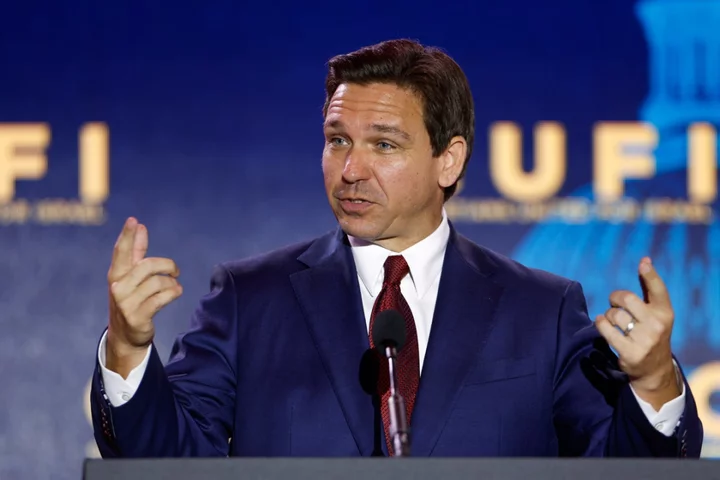
Why Florida’s new curriculum on slavery is becoming a political headache for Ron DeSantis
Why was a major candidate for the presidency just asked about a lesson set to be taught to middle school students in Florida social studies classes? Governor Ron DeSantis found himself answering yet more questions about his state’s new conservative-friendly social studies curriculum at a press event in Utah over the weekend as the Republican sees continued signs that his record on racial and social issues in the Sunshine State will be an issue in the upcoming GOP primary debates and, potentially, the 2024 general election. Mr DeSantis’s campaign held a summit with donors in Utah this past weekend where top advisers pledged a reboot to the Florida governor’s stagnating presidential bid including cutbacks to pricy expenditures including private events that have not helped his standings in the polls improve. The candidate himself held a press conference on Friday, where the question about Florida schools was directed to him. The Florida Department of Education’s social studies standards for the 2023-2024 school year, released this month, provide lesson topics for middle school teachers including a “benchmark clarification” which instructs educators to teach students that “slaves developed skills which, in some instances, could be applied for their personal benefit”. It isn’t clear what “their personal benefit” would be in this scenario. The line is included as part of a broader lesson entitled: “Examine the various duties and trades performed by slaves (e.g., agricultural work, painting, carpentry, tailoring, domestic service, blacksmithing, transportation).” Mr DeSantis has come under fire for the curriculum changes, from both Democrats and Republicans alike. Last week, Vice President Kamala Harris railed against Mr DeSantis without naming the Florida governor. “There is a national agenda afoot. Extremist so-called leaders for months have dared to ban books. … Extremists here in Florida, passing a law ‘Don’t Say Gay,’ trying to instill fear in our teachers … And now, on top of that, they want to replace history with lies.” And former New Jersey Gov Chris Christie, who is seeking the 2024 GOP presidential nomination, also called out the governor for what he claimed was a lack of leadership. While the change to the curriculum itself is subtle — a single sentence added to a much larger document — the news of its insertion played into a larger narrative of Florida’s right-wing shift under the DeSantis administration. Florida schools, in particular, are the biggest battleground for this war, where liberal groups and nonpartisan experts alike warn that students are increasingly the recipients of a whitewashed educational environment devoid of anything that conservatives find unseemly or uncomfortable, such as discussions of the sins of slavery, representation of LGBT+ persons in the classroom or teaching materials, and other narratives that brush up against conservative belief systems. The changes to Florida schools had already earned the state the condemnation of the NAACP and other civil rights groups, something that has enraged conservatives and drawn the state into an ugly national fight against any group or organisation that the governor perceives to have a liberal agenda, including the Disney corporation. Now, he is officially a candidate for president and facing the reality that his loyally conservative record in Florida has failed to allow him to make serious inroads against Donald Trump and his support base, while he remains engaged in fighting off competitive rivals like Vivek Ramaswamy and others in the crowded Republican primary contest. It remains to be seen whether his campaign reset (which continued this week with layoffs of roughly a third of his staff) will be a necessary fat-trimming measure or the sign of his campaign’s early demise; what is certain is that the issue of the quality of education in Florida’s schools is not going away, at least any time soon. Read More Four cars in Ron DeSantis motorcade crash into each other on way to Tennessee fundraisers Biden laughs off impeachment threat after McCarthy teases inquiry Trump goes on late-night Truth Social rampage against ‘loser’ and ‘lowlife’ Mitt Romney Ron DeSantis: The new Jeb Bush Why was Donald Trump impeached twice during his presidency? DeSantis campaign fires aide behind neo-Nazi meme video
2023-07-27 01:47

Ilhan Omar supports woman jailed for taking abortion pill and burning foetus: ‘A violation of autonomy’
Ilhan Omar has spoken out in defence of a teenage girl who was jailed for 90 days after taking an abortion pill to end an unwanted pregnancy. The Democratic congresswoman posted an image on Instagram of an article titled: “Nebraska teen who used pills to end pregnancy gets 90 days in jail”. “This is a freighting violation of privacy and autonomy…” Ms Omar wrote. Celeste Burgess, 19, was sentenced last week after she and her mother Jessica Burgess, 42, pleaded guilty to charges earlier this year. Prosecutors said Celeste Burgess used abortion pills well beyond the 10-week limit approved by the Food and Drug Administration. Court records reveal that she terminated her pregnancy when she was nearly 30 weeks pregnant, surpassing the generally recognised point of viability at 23 to 24 weeks. At that stage, a foetus would have a higher chance of survival outside the womb. The mother and daughter were charged after their private Facebook messages were obtained by the police. These messages revealed their plans to end Celeste’s pregnancy by using abortion pills ordered online and then “burn the evidence”. The teenager was not charged by prosecutors under Nebraska’s abortion law. Prosecutors agreed to drop two charges of concealing a death and false reporting against her after she pleaded guilty in May to concealing human skeletal remains. Celeste was also sentenced to two years probation apart from her 90 days’ jail sentence. Joseph Smith, the top prosecutor in Madison County, Nebraska, said the sentence “seems reasonable” as the teenager has no criminal history. “It’s a painful case for everybody,” he said, adding that it was the first case of its type that he had prosecuted in his 33-years-long career “and I’m glad it’s over”. Jessica Burgess meanwhile faces up to five years in jail. The case has prompted widespread discusson, wth Ms Omar the latest to comment on the case. Her post had garnered more than 68,000 likes as of early Tuesday morning, with comments fom her supporters including that the case was “like the beginning of the Handmaid’s Tale”. Read More Teen who took abortion pill to end pregnancy given 90 days in jail Texas women detailed agonising pregnancies after being denied abortions. The state blames doctors After Roe v Wade fell, this father-daughter duo left Texas to go on providing abortions AOC and other progressives to boycott Israeli president’s joint address to Congress Israel's president will meet with Biden as concerns over settlements, judicial overhaul continue Thai Parliament postpones vote to select new prime minister pending court ruling
2023-07-25 19:56

American Ferrera's Barbie speech has so many unused versions
'Barbie' star America Ferrera delivered her speech in a lot of different ways.
2023-07-25 15:29

White House sets up new pandemic preparedness office
The Biden administration will centre White House efforts to address threats of various transmissible diseases, pathogens and other biological agents in a new permanent office headed by a member of the National Security Council (NSC). The White House announced the creation of the Office of Pandemic Preparedness and Response Policy (OPPR) on Friday. OPPR will be “charged with leading, coordinating, and implementing actions related to preparedness for, and response to, known and unknown biological threats or pathogens that could lead to a pandemic or to significant public health-related disruptions in the United States”, according to a handout. The new office will shift the White House’s Covid reponse efforts from a standalone team to a broader group that will include experts working on a number of different potential “public health-related disruptions”, including new variants of the influenza (common flu) virus. “Under President Biden’s leadership, the Administration has taken significant steps to ensure all individuals have continued access to lifesaving protections such as vaccines, treatments, and tests, and that the nation is well prepared to manage the risks of COVID-19 or other causes of potential pandemics in the future,” a White House statement read. The office’s inaugural director will be Major General (retired) Paul Friedrichs, special assistant to President Biden and the Senior Director for Global Health Security and Biodefense on the National Security Council. The new office comes three months after Mr Biden formally ended the national emergency declaration over the pandemic. More than 1.1 million Americans have died from Covid since it first emerged in the US in early 2020. Mr Biden lobbied Congress against passing the resolution to end the national emergency but nevertheless signed the bipartisan piece of legislation when it hit his desk in April. The president had previously declared the Covid pandemic “over” in 2022, telling CBS’s 60 Minutes: “We still have a problem with Covid. We're still doing a lot of work on it. But the pandemic is over. If you notice, no one's wearing masks.” Read More The fight over Alabama's congressional redistricting now shifts back to federal court DeSantis downplays Jan. 6, says it wasn't an insurrection but a 'protest' that 'ended up devolving' Biden names CIA Director William Burns to his Cabinet
2023-07-24 05:19

Movie theater assault victim speaks out after seat dispute turned violent
A 63-year-old moviegoer who was assaulted after asking a couple to move from his reserved seats revealed how the younger attacker “just went to town on me.” The victim, who has not been identified, reserved VIP tickets with his wife for a movie on 10 July at the AMC Pompano Beach 18 theater. He arrived to find another man and woman sitting in the seats and asked them to move. “This guy just kept staring at me instead of getting up,” the victim told NBC6 on Friday. “I said to the people at this point, who didn’t apologize or say thank you, I said, ‘You guys can just keep the seats.’ “As I’m walking away, he said ‘Go run to your wife little boy.’ So I turned around and I said, ‘You know, I’m not the one who’s being a little boy, you took my seats and you didn’t apologize or you didn’t say thank you and I let you keep them.’” “He jumped up, he wanted to fight me, he backed me up, I fell over the stairs and as soon as I fell down the stairs, it was like a boxer being against the ropes, this guy just went to town on me,” the victim said. He told the station that he “couldn’t even get a defensive shot in.” “It happened so fast,” he said. “He basically sucker-punched me, is what he did.” The victim is a disabled veteran and suffered a broken nose and needed stitches at a local hospital, the station reported. “I didnt think anybody would be stupid enough to actually start a fight like that in the movies,” the victim said. Broward Sheriff’s Office Violent Crimes Unit detectives have released video of the attack. “In the heated moment, the victim loses his balance and falls down the steps,” the office said in an accompanying release. “The subject is seen standing above the 63-year-old victim repeatedly punching him in the face until witnesses rushed to the victim’s aid and pulled the subject off him. “The subject and the adult female left the theater.” Authorities have appealed to the public for help in identifying the couple. Read More Man attacked at movie theatre for asking couple to move out of his seat Boy charged over serious assault in Dublin Family of award winning artist paralysed in random NYC subway shove attack speak out Woman jailed for killing fellow hospital patient, 83, in unprovoked attack Barbie doubles Oppenheimer’s earnings in box office previews
2023-07-24 02:54
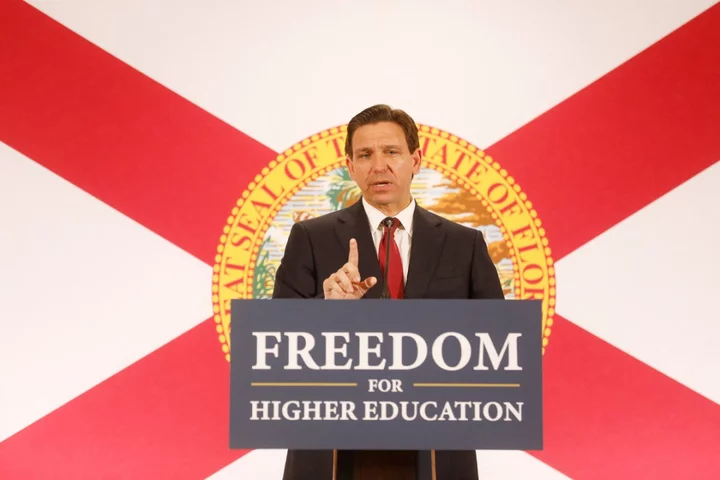
Florida school guidelines can punish trans students and teach how slavery ‘developed skills’ for Black people
A new set of standards for African American history in Florida schools will teach middle schoolers how enslaved people “developed skills” that could be “applied for personal benefit”. Another guideline instructs high schoolers to be taught that a massacre led by white supremacists against Black residents in Ocoee to stop them from voting in 1920 included “acts of violence perpetrated against and by African Americans.” Members of the Florida Board of Education have defended the standards for African American history lessons they unanimously approved, with Ron DeSantis-appointed board member MaryLynn Magar assuring the attendees at a hearing in Orlando on 19 July that “everything is there” and that “the darkest parts of our history are addressed” in the curriculum. But civil rights advocates, educators and Democratic state lawmakers have warned that elements of the guidelines present a distorted, revisionist picture of the state’s history of racism. “The notion that enslaved people benefitted from being enslaved is inaccurate and a scary standard for us to establish in our education system,” Democratic state Rep Anna Eskamani told the board. State Senator Geraldine Thompson said that a recommendation suggesting that Black people sparked the Ocoee massacre is “blaming the victim”. Ms Thompson helped pass a law in 2020 that requires schools to teach lessons about the massacre. The Florida Education Association, the state’s largest teachers union, said in a statement that the standards represent “a big step backward for a state that has required teaching African American history” for more than three decades. “Our children deserve nothing less than truth, justice, and the equity our ancestors shed blood, sweat, and tears for,” NAACP president Derrick Johnson added in a statement. “It is imperative that we understand that the horrors of slavery and Jim Crow were a violation of human rights and represent the darkest period in American history. We refuse to go back.” The new standards add another victory in the DeSantis administration’s radical education overhaul and a “parents’ rights” agenda that has restricted honest lessons of race and racism in state schools, reshaped local school boards, and banned public colleges from offering classes that “distort significant events” or “teach identity politics”. Florida’s Board of Education also adopted five rules targeting LGBT+ students, including punishing transgender students and staff who use restrooms that align with their gender and add barriers to students who want their names and pronouns respected in and out of the classroom. LGBT+ advocates have accused the board and the governor’s administration of weaponizing state agencies to implement the DeSantis agenda as he mounts a national campaign, fuelled in part by what opponents have called “Don’t Say Gay” legislation adopted by several other states. That bill, which Mr DeSantis signed into law in 2022 and expanded earlier this year, has sparked fears that its broad scope could be used to effectively block discussion of LGBT+ people, history and events from state schools, and threaten schools with potential lawsuits over perceived violations. “This politically motivated war on parents, students, and educators needs to stop,” said Jennifer Solomon with Equality Florida. “Our students deserve classrooms where all families are treated with the respect they deserve and all young people are welcomed,” she said in a statement. “Let parents be parents. Let educators be educators. And stop turning our kids’ classrooms into political battlefields to score cheap points.” The African American history curriculum advanced by the board does not fully adopt the recommendations from the African American History Task Force, which urged the board to consider “contemporary issues impacting Africans and African Americans”. Education Commissioner Manny Diaz defended the standards as an “in-depth, deep dive into African American history, which is clearly American history as Governor DeSantis has said, and what Florida has done is expand it.” Under the new standards, students will be taught to simply “identify” famous Black people, but it fails to add requirements for students to learn about their contributions, challenges and stories overall. “We must do better in offering a curriculum that is both age-appropriate and truthful,” according to Democratic state Rep Dianne Hart, chair of Florida’s Legislative Black Caucus. “Education is a critical part of an individual’s personal foundation and when you chose to build a foundation on falsehoods, lies, or by simply erasing history, you’ve laid a foundation that will ultimately fail,” she said in a statement. The board’s adoption of the standards follow the board’s decision to ban the teaching of Advanced Placement African American Studies in high schools, claiming that the course “significantly lacks educational value” and “inexplicably” contradicted Florida law. A letter dated 12 January from the Florida Department of Education to the College Board, which administers AP exams, said the board is welcome to return to the agency with “lawful, historically accurate content”. Read More DeSantis campaign video crossed a line for gay right-wing pundits despite governor’s record on LGBT+ rights Florida schools remove books by John Milton and Toni Morrison and restrict Shakespeare under DeSantis rules Jury awards Florida girl burned by McDonald's Chicken McNugget $800,000 in damages Florida rulings ease concerns about drag performers at Pride parades, drag queen story hours What are the 10 largest US lottery jackpots ever won?
2023-07-21 04:56

Trump defends Jason Aldean amid music video backlash
Former President Donald Trump spoke out in favor of country singer Jason Aldean amid controversy around one of his new music videos. “Jason Aldean is a fantastic guy who just came out with a great new song. Support Jason all the way. MAGA!!!” the former president wrote on Truth Social on Thursday. Online critics blasted the “Try That In A Small Town” music video after discovering it was filmed outside the Maury County Courthouse in Columbia, Tennessee, where 18-year-old Black teenager Henry Choate was lynched in 1927, as well as where the Columbia race riot was held in 1946. As of Wednesday, Country Music Television said it refused to air the music video, USA Today reported. His music video was released Friday. Critics have accused the song of “promoting violence” and lynchings. Mr Aldean responded to the criticism in a lengthy tweet on Tuesday. He said for him, the song “refers to the feeling of a community that I had growing up, where we took care of our neighbors, regardless of differences of background or belief. Because they were our neighbors, and that was above any differences.” He added, “while I can try and respect others to have their own interpretation of a song with music – this one goes too far.” The country singer is a mass shooting survivor. Shannon Watts, founder of Moms Demand Action, reacted to the song’s lyrics: Mr Aldean “who was on-stage during the mass shooting at a Las Vegas concert in 2017 that killed 60 people and wounded over 400 more - has recorded a song called “Try That In A Small Town” about how he and his friends will shoot you if you try to take their guns.” Fellow 2024 presidential candidate and Florida Gov Ron DeSantis also chimed in with support for the country singer in an interview on “Fox & Friends”: “We need to restore sanity to this country. I mean, what is going on that that would be something that would be censored? I mean, give me a break. We’re off the rocker here.” South Dakota Republican Gov Kristi Noem posted a video on Wednesday with her reaction to the music video’s backlash: “I’m shocked by what I’m seeing with people attempting to cancel the song, cancel Jason.” She added, “Thank you for writing a song that America can get behind.” Read More ‘A modern lynching song’?: Jason Aldean and the most controversial song in country Jason Aldean responds as row continues over ‘Try That in a Small Town’ The Jason Aldean video is just the tip of the country music iceberg
2023-07-21 04:17
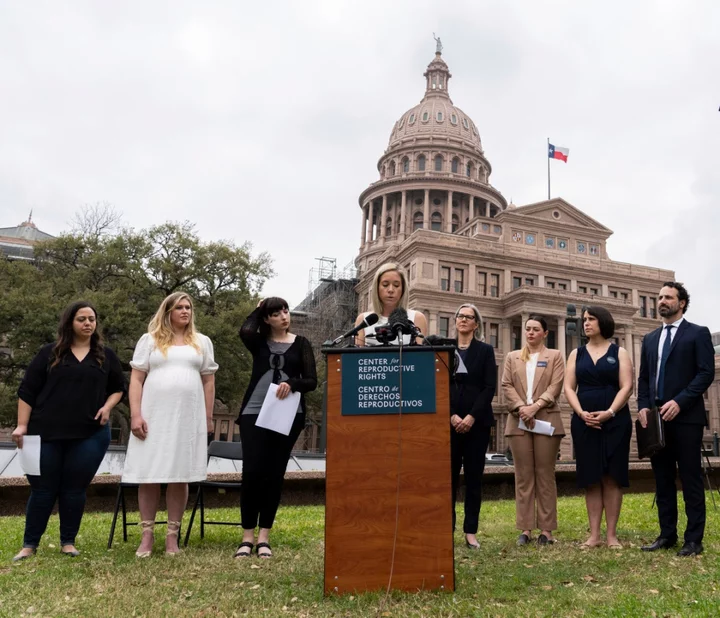
Texas women suing over anti-abortion law give historic and heartbreaking testimony in a landmark court case
In March, unable to legally obtain abortion care in Texas, Samantha Casiano was forced to carry a nonviable pregnancy to term, and gave birth to a three-pound baby who died hours later. Ms Casiano is among 13 women denied emergency abortion care under state law who are suing the state in a landmark case that is now in front of a Texas judge. In harrowing, historic courtroom testimony in Austin on 19 July, Ms Casiano and two other plaintiffs described their agony, isolation and heartbreak as they detailed their traumatic, life-threatening pregnancies and the state’s failure to care for them. As she described her experience to the court through tears, Ms Casiano vomited from the witness stand. “I watched my baby suffer for four hours,” she said in her testimony. “I am so sorry I couldn’t release you to heaven sooner. There was no mercy for her.” Abortion rights legal advocacy group Center for Reproductive Rights Texas filed the lawsuit on behalf of the women in March to force Texas authorities to clarify emergency medical exceptions to the state’s overlapping anti-abortion laws, marking the first-ever case brought by pregnant patients against such laws. Their testimony has underscored the depth of impacts from Texas laws and similar anti-abortion laws across the country, with abortion access stripped away for millions of Americans who are now exposed to dangerous legal and medical minefields during their pregnancies. The conflicting exemptions for medical emergencies in Texas have resulted in widespread confusion among providers and hospitals fearing legal blowback or severe criminal penalties, according to abortion rights advocates. Healthcare providers in the state found in violation of those laws could lose their medical license, face tens of thousands of dollars in fines, or receive a sentence of life in prison. The plaintiffs “suffered unimaginable tragedy” directly because of the state’s anti-abortion laws, Center for Reproductive Rights attorney Molly Duane said in her opening arguments. Texas officials and the state’s medical board have “done nothing” to clarify the law, she said. “I feel like my hands are tied,” said Houston obstetrician-gynecologist Dr Damla Karsa. “I have the skill, training and experience to provide care but I’m unable to do so. It’s gut-wrenching. I am looking for clarity, for a promise that I’m not going to be prosecuted for providing care.” Attorneys for the state have sought to dismiss the case altogether, arguing in court filings that the women lack standing to challenge the law because it is ultimately uncertain they will face similar complications again, that their “alleged prospective injuries are purely hypothetical”, and that some of the plaintiffs admitted they have since “struggled to become pregnant” again after their traumatic experiences. Amanda Zurawski, the lead plaintiff in the case, is still hoping to become pregnant after her life-threatening pregnancy. She called the state’s argument “infuriating and disgusting and ironic.” “Do they not realise the reason why I might not be able to get pregnant again is because of what happened to me as a result of the laws that they support?” she told the court. “Anybody who’s been through infertility will tell you it is the most isolating, grueling, lonely, difficult thing a person can go through.” ‘I wished I was dreaming. I knew I wasn’t’ Ms Casiano, a mother of four, was hoping for a girl. When she visited her physician for a checkup last September, “all of a sudden the room went cold” and quiet, she testified. Her daughter was diagnosed with anencephaly, a fatal birth defect in which a baby is born without parts of a brain or skull. “My first thought was … ‘maybe it’s a surgery, maybe she can be fixed,’ and then she said, ‘I’m sorry, but your daughter is incompatible with life, and she will pass away before or after birth,’” Ms Casiano said. “I felt cold,” she said. “I was hurt. I wished I was dreaming. I knew I wasn’t. I just felt lost.” A case worker at her obstetrician’s office gave her a pamphlet with funeral homes. She was prescribed antidepressants. She could not be referred for abortion care anywhere in the state. Texas was the first to implement a near-total ban on abortion, months before the US Supreme Court struck down the constitutional right to abortion last June, a decision that triggered a wave of state laws and legislation from anti-abortion lawmakers and governors to restrict care and threaten providers with criminal penalties. Amanda Zurawski endured several rounds of fertility treatments, tests, surgeries and misdiagnoses before learning she was pregnant in May of last year. “We were at first in shock … we were over-the-moon excited,” Ms Zurawski said. But her obstetrician discovered that she dilated prematurely, and soon after her membranes ruptured, draining amniotic fluid and endangering the life of her expected child. Doctors informed her there was nothing they could do under what was recently enacted state law, despite knowing with “complete certainty we were going to lose our daughter,” she said. The condition led to life-threatening sepsis. Doctors ultimately induced labor. Her daughter, which she named Willow, was not alive when she delivered. Ms Zurawski and her husband are still trying for pregnancy, but the trauma has closed one of her fallopian tubes, and a doctor had to surgically reconstruct her uterus. They also are considering in vitro fertilization, surrogacy and adoption. She previously testified to members of Congress about her experience, a story she will continue to tell, even if it is “excruciating” to do so, she told the Texas courtroom. “I know that what happened to me is happening to people all over the country. … So many people are being hurt by similarly restrictive bans,” she said. She has spoken out “because I can, and I know a lot of people who are experiencing or will experience something similar who can’t speak out, and it’s for those people I will,” she said. Healthcare providers caring for pregnant patients in the months after the Supreme Court’s decision to overturn Roe v Wade have faced severe obstacles for providing standard medical care in states where abortion is effectively outlawed, leading to delays and worsening and dangerous health outcomes for patients, according to a first-of-its-kind report released earlier this year. Individual reports from patients and providers like those named in the Texas lawsuit have shed some light on the wide range of harm facing pregnant women in states where access to abortion care is restricted or outright banned. But reporting from the University of California San Francisco captures examples from across the country, painting a “stark picture of how the fall of Roe is impacting healthcare in states that restrict abortion,” according to the report’s author Dr Daniel Grossman. More than a dozen states, mostly in the South, have effectively outlawed or severely restricted access to abortion care after the Supreme Court’s decision in Dobbs v Jackson Women’s Health Organization last June. The decision has also opened new legal challenges, ones that could once again reshape the future of abortion access in America, while anti-abortion lawmakers and Republican candidates face a public that is overwhelmingly against such bans. ‘I don’t feel safe to have children in Texas anymore’ Ashley Brandt sent a picture of an ultrasound to her husband when she found out she was pregnant with twins. But after her 12-week ultrasound last May, doctors discovered one of the twins had acrania, in which the skull of the fetus is not formed, and brain tissue is exposed to amniotic fluid. The condition is fatal. Despite no chance of the twin’s survival, Ms Brandt was not eligible under Texas law for a procedure called a selective fetal reduction; Twin A still had some signs of life, like muscle spasms and cardiac activity. They traveled to neighbouring Colorado for care, and she returned home the day after the procedure. She gave birth to her daughter in November. “If I had not gone out of state and just done what was legal in Texas, my daughter … would likely have been in the [neonatal intensive care unit],” she said. “All of my ultrasounds leading up to labor I would have had to watch twin A … deteriorate more and more, every ultrasound. … I would have to give birth to an identical version of my daughter without a skull, without a brain, and I would have to hold her until she died, and I would have to sign a death certificate, and hold a funeral.” She said the state has failed to account for medical emergencies like hers. “I don’t feel safe to have children in Texas anymore,” she said. “It was very clear that my health didn’t really matter, that my daughter’s health didn’t really matter.” Read More ‘I felt I couldn’t tell anyone’: The stigma of abortion keeps women silent. It’s time for us to shout Ohio voters are likely to decide the future of abortion rights One year after Roe v Wade fell, anti-abortion laws threaten millions. The battle for access is far from over
2023-07-20 08:59
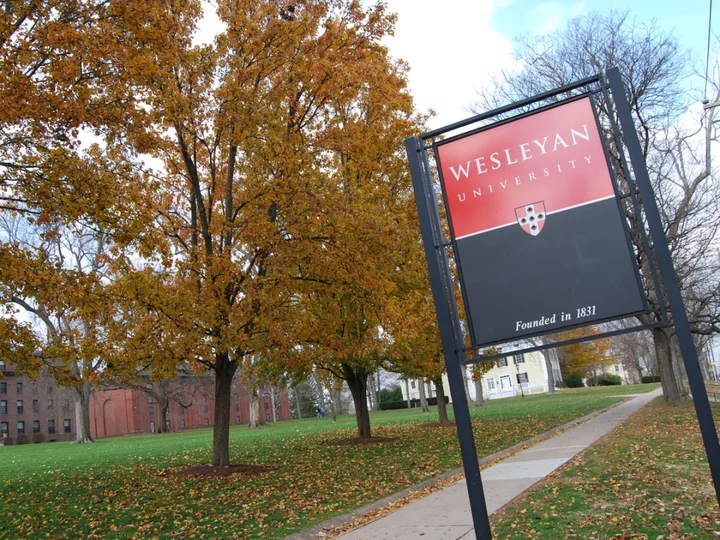
Elite liberal arts university ends legacy admissions in wake of Supreme Court ruling on affirmative action
An elite liberal arts university has taken steps in re-evaluating its admission process by ending legacy preferences following the Supreme Court’s decision to strike down affirmative action. Wesleyan University, a private college in Connecticut, announced in a letter on Wednesday that terminating its use of legacy admissions would benefit diversity on campus and cited the Court’s ruling as a catalyst in the decision. “In the wake of the recent Supreme Court decision regarding affirmative action, we believe it important to formally end admissions preference for ‘legacy applicants,’” Wesleyan University President Michael S Roth wrote. “We still value the ongoing relationships that come from multi-generational Wesleyan attendance, but there will be no ‘bump’ in the selection process.” The school is the first prominent higher education institution to end legacy admissions following the Court’s decision to end affirmative action in June. Going forward, Wesleyan said it will promote a diverse student body by recruiting students from areas across the US outside of big cities and coasts, recruiting veterans and investing in a pipeline to recruit community college graduates. They also plan to increase financial aid support by normalising a three-year option, creating a scholarship program to recruit and support undergraduates from Africa and developing more free-credit bearing courses online. In his letter, Mr Roth clarified that an applicant’s connection to the university has never guaranteed them a spot and family members of alumni are admitted on their own merits “as has been almost always the case for a long time.” The announcement marks Wesleyan’s formal ending of any legacy-based admissions. Wesleyan joins a small group of other colleges and universities that have ended legacy admissions like Amherst College which concluded legacy preference in 2021, John Hopkins University which made the decision in 2020 and Massachusetts Institute of Technology (MIT) which has never considered legacy. For more than 20 years, colleges and universities have used affirmative action to help establish a diverse pool of accepted students. Race is not used as the sole factor in determining a student’s acceptance but it can be considered if there are two applicants with nearly identical qualifications that meet or exceed the school’s application standard. Mr Roth echoed this in his letter, saying Wesleyan “has never fixated on a checked box indicating a student’s racial identification” and has always taken a “holistic view” by looking at applicants’ records, letters of recommendation, college essays and more. But in a 6-3 decision last month, the Court struck down the long-used tool in two consolidated cases: Students for Fair Admissions v Harvard and Students for Fair Admissions v University of North Carolina. Now, institutions of higher education can no longer consider race as a factor unless a student volunteers information about their race or culture in their personal essay. Advocates of affirmative action called on colleges and universities to re-evaluate their admissions processes and establish other methods of cultivating a diverse campus. President Joe Biden encouraged schools to “not abandon their commitment to ensuring student bodies of diverse backgrounds” and directed the Department of Education to analyse practices that hold diversity back. Those practices include legacy admissions which Mr Biden said, “expands privilege instead of opportunity.” Read More Supreme Court strikes down affirmative action, banning colleges from factoring race in admissions Slim majority of Americans support Supreme Court’s affirmative action ruling, but most believe politics rules the court Harvard sued over ‘legacy admissions’ after Supreme Court targets affirmative action Biden condemns Supreme Court striking down affirmative action: ‘This is not a normal court’
2023-07-20 00:45

Tupac Shakur - News: Las Vegas police search home in connection with historic murder of hip hop star
Las Vegas police confirmed Tuesday (18 July) that it has issued a search warrant in connection with the unsolved murder of rapper Tupac Shakur. Shakur (also known by his stage name 2Pac) was fatally shot in September 1996 in a drive-by shooting in the Nevada city; he was 25. The Las Vegas Metropolitan Police Department told The Associated Press that a search warrant was executed for a home in the nearby city of Henderson. Police made entry into the home on 17 July; however, no further details on the search have been made available at this time. No arrests have ever been made in the case. Shakur had attended a boxing match with the now-incarcerated record executive Suge Knight in Vegas when a car pulled up alongside theirs on Las Vegas Boulevard and opened fire. The rapper was struck four times in the shooting and died six days later from internal bleeding.
2023-07-19 11:27
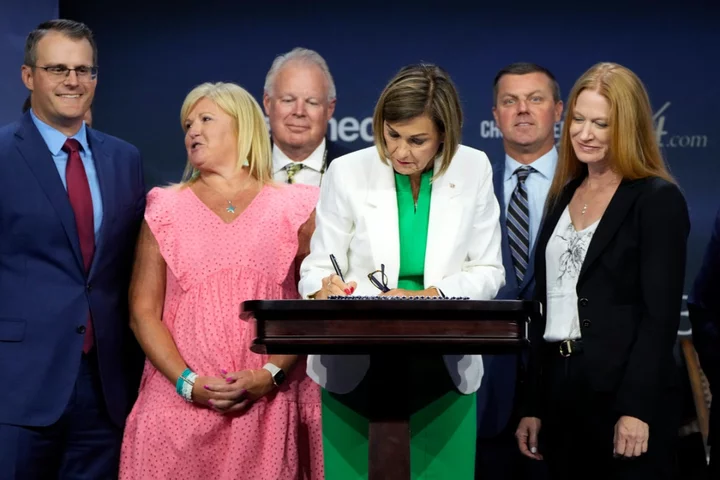
Iowa governor plans to appeal block on restrictive abortion law
Iowa Gov. Kim Reynolds said on Tuesday that plans are in progress to appeal a temporary block on the state's new, restrictive abortion law, previewing a likely emotional court battle that could take months to resolve. Reynolds told reporters at the Iowa Capitol that her staff is working with lawyers in Attorney General Brenna Bird's office to work out the details, so “it's just a matter of time,” she said. The Republican-controlled Legislature approved the measure to ban most abortions after about six weeks of pregnancy during a special session last week, and it went into effect Friday, immediately after Reynolds signed it. The ACLU of Iowa, Planned Parenthood North Central States and the Emma Goldman Clinic launched a legal challenge and on Monday, Judge Joseph Seidlin granted their request to pause the law as the courts assess its constitutionality. Abortion providers said they scrambled to fit in as many appointments as possible before the governor signed the bill, making hundreds of calls to prepare patients for the uncertainty and keeping clinics open late. After the ruling, providers at Planned Parenthood and the Emma Goldman Clinic indicated they were relieved but conscious of the long legal fight ahead. “I think the bill that we passed is constitutional, especially with the changes that we’ve seen," said Reynolds, who alluded to the Iowa Supreme Court and the U.S. Supreme Court reversing previous rulings that affirmed a woman's fundamental right to abortion. “We passed it, it went into law, and for three days we were saving babies,” she said. “I think the right to life is the most important right that we have.” Read More Ukraine war’s heaviest fight rages in east - follow live Charity boss speaks out over ‘traumatic’ encounter with royal aide
2023-07-19 05:24

CEOs Urge EU to Clear Red Tape Bogging Down Bloc’s Green Shift
Executives from the likes of Volkswagen AG and Ericsson AB are calling on the European Union to remove
2023-07-12 23:18
